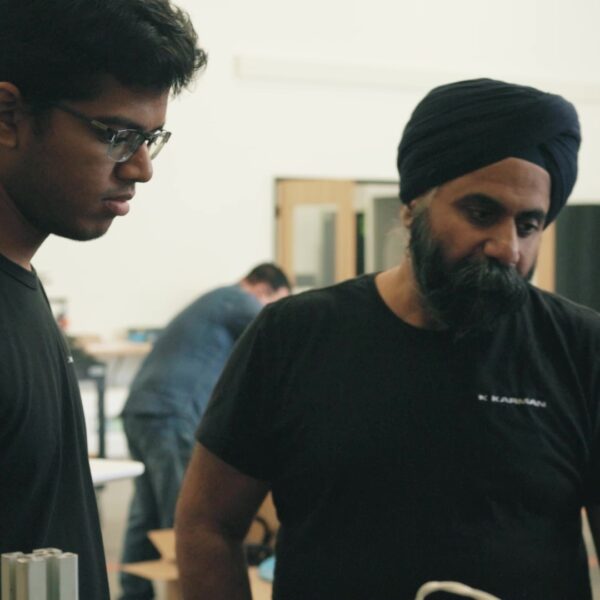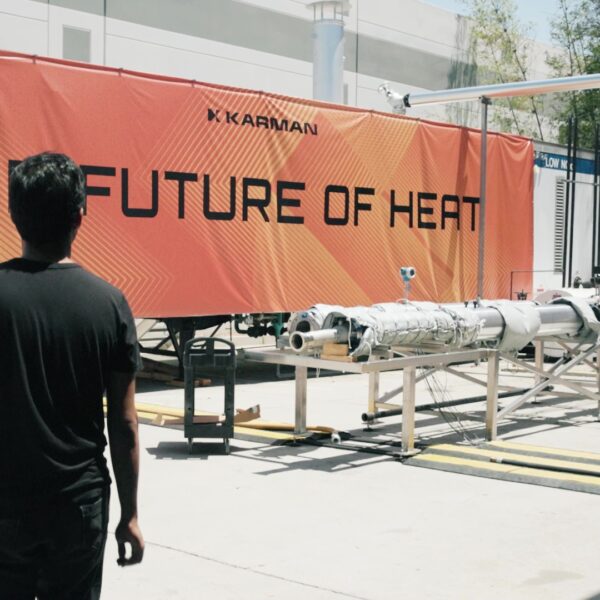Karman Industries, founded in Long Beach in 2024, is a turbomachinery company on a mission to build the most efficient way to move between heat and electricity. Their technology takes cues from rockets, EVs, and advanced manufacturing to deliver a step-change in how the world manages thermal energy.
The potential impact is massive. Roughly half of all end energy is used for thermal management, and much of it is wasted. Today’s systems are expensive, inefficient, and carbon intensive. Karman is breaking that cycle with compact, modular machines that can serve a range of industries, from manufacturers that need process steam to data centers that demand advanced cooling.
The Opportunity Hidden in Industrial Heat
Industrial heat thermal management hasn’t evolved since the 1800s. “Despite the importance of heat in industrial manufacturing, the underlying technology hasn’t changed in over 150 years,” says CEO David Tearse. “Most industrial sites still rely on outdated, inefficient thermal systems that waste energy, increase costs as well as emissions.” That waste is enormous, industrial boilers contribute over 20% of global emissions and thermal management consumes roughly half of all end-use energy. Industries have had to live with these inefficient solutions, because the alternatives have been exceedingly expensive and complex.
Karman set out to design the next generation of thermal systems utilizing advanced turbomachinery that provides a step function change in efficiency, cost, and size. Co-Founders Tearse and CTO Chiranjeev Kalra built a team of aerospace and power electronics veterans to deliver a compact, modular platform that improves efficiency tenfold and pays for itself in months.
At a Glance: Karman Industries
- Slashed prototyping timelines by generating and testing hundreds of heat exchanger designs overnight, turning months of work into days.
- Achieved a 70% reduction in development cost by validating designs digitally before fabrication.
- Delivered a 95% reduction in system size, redefining what’s possible for industrial thermal equipment.
- Equipped a lean team with enterprise-grade multiphysics simulation and automation through the Ansys Startup Program
Advanced tools for startup innovation
Big ambitions require big tools. As a seed stage company, Karman looked for a cost-effective solution while still getting world-class simulation to design their compressor. That’s where the Ansys Startup Program came in. Through KETIV, Karman gained affordable access to a full suite of Ansys multiphysics solvers – CFD, structural, thermal and electromagnetic, along with expert guidance on how to stitch them together. Digital twins of compressors and heat exchangers let them simulate refrigerant behavior at supercritical conditions, material durability at 300°C, and vibration modes before committing to cutting metal.
“We were basically doing rocket science calculations on industrial thermal systems. The Startup Program gave us enterprise-grade simulation power at a price a startup can handle.”

Automation to unlock new concepts
KETIV’s automation team took it further by helping Karman build a custom workflow that linked parametric CAD models to Ansys Workbench.
Scripts automatically adjusted fin spacing, channel widths and material assignments, submitted the runs, and compiled the data. Engineers then used response surface optimization to find designs that maximized heat transfer coefficients while keeping pressure drops and stress within limits.
“Design automation lets us generate hundreds of geometries overnight. We’d wake up, sort through the results, and zero in on the most promising designs. That turned months of prototyping into days.”
The collaborative spirit was key. Vince Tarantini, Karman’s Head of Turbomachinery, notes that, “partnering with KETIV helped us set up distributed computing, and built custom scripts to accelerate our process. For a lean team juggling development, engineering, recruiting, and more, having seasoned simulation experts on call was invaluable.”
Project Results: Smaller, faster, and smarter thermal systems
Looking ahead
With their first serial‑numbered units slated for 2026, the Karman team is ramping up production and exploring additional thermal markets like data centers and district heating, as well as distillation and cooling applications.
The Ansys Startup Program continues to give them access to advanced solvers as their needs grow, and KETIV remains a trusted partner for automation, training and support.
“This is more than a story about more efficient boilers. Karman is showing how first-principles thinking and modern turbomachinery can rewire the way industry moves between heat and electricity. It’s faster, cleaner, and far more efficient, setting a new bar for how industry should run.”
